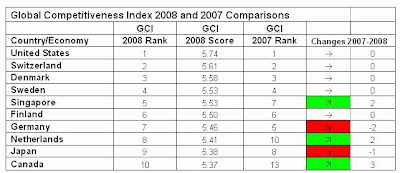The World Economic Forum (WEF) has published The Global Competitiveness Report 2008-2009. Click here for highlights of the report. The US, followed by Switzerland, Denmark, Sweden, Singapore, and Finland are the top five competitiveness nations in the world, according to the report. Below are the top ten nations and their comparative movement along the list.

China is in 30th position (up by 4 positions from last year), India is in 50th position (down by 2 positions from last year), and Nepal is in 126th position (down by 12 positions from last year). From the Sub-Saharan Africa, Tunisia is in 36th position (up by 4 positions), South Africa is in 45th position (up by one position), Botswana is in 56th position (up by 20 positions), and Mauritius is in 57th position (up by 3 positions).
Among the 134 countries included in the report, the last ten, except for Nepal and Timor-Leste, are African nations. The bottom ten in the report are: Madagascar, Nepal, Burkina Faso, Uganda, Timor-Leste, Mozambique, Mauritania, Burundi, Zimbabwe, and Chad.
The co-author of the report states that amidst rising food and energy prices, international financial crisis, and slowdown in leading economies, the importance of a competitiveness-supporting economic environment is even higher as this helps to fend off these kinds of shocks in domestic economies.
“Rising food and energy prices, a major international financial crisis and the related slowdown in the world’s leading economies, are confronting policy-makers with new economic management challenges. Today’s volatility underscores the importance of a competitiveness-supporting economic environment that can help national economies to weather these types of shocks in order to ensure solid economic performance going into the future,” said Xavier Sala-i-Martin, Professor of Economics, Columbia University, USA, and co-author of the report.
Well, this needs a little bit of explaining to show how competitiveness-supporting economic environment actually help weather the financial and economic crisis, like the current one, emanating from the developed countries! Are the most competitive nations weathering the impact of the current financial crisis right now? Or, is there evidence that the least competitive nations not being able to weather the impact of the recent financial crisis? Put it another way: Is competitive environment helping weather the impact and risks inflicted by the current financial crisis and rise in commodity and fuel prices? Note that I am not doubting the power of markets!
Meanwhile, the director of WEF’s global competitiveness network said:
…despite the present turmoil the index was still relevant because it measured a wide range of factors important for long-term growth in productivity and living standards…Once the global economy emerges from the current financial crisis, which it will, the countries that do well on our index are those that are best prepared to bounce back and perform well in the longer term
The report looks at twelve “pillars of competitiveness” namely institutions, infrastructure, macroeconomic stability, health and primary education, higher education and training, goods market efficiency, labor market efficiency, financial market sophistication, technological readiness, market size, business sophistication, and innovation.
Finally, this one from the FT:
Like the rival index produced by the Swiss-based IMD business school, the WEF index relies heavily on the views of business executives as well as statistical data, and the rankings depend crucially on the weights given to the various factors.
This helps to explain some oddities in the WEF rankings. For instance, Qatar and Saudi Arabia are ranked above China (30), while now bankrupt Iceland (20) tops rich and solid Luxembourg (25).